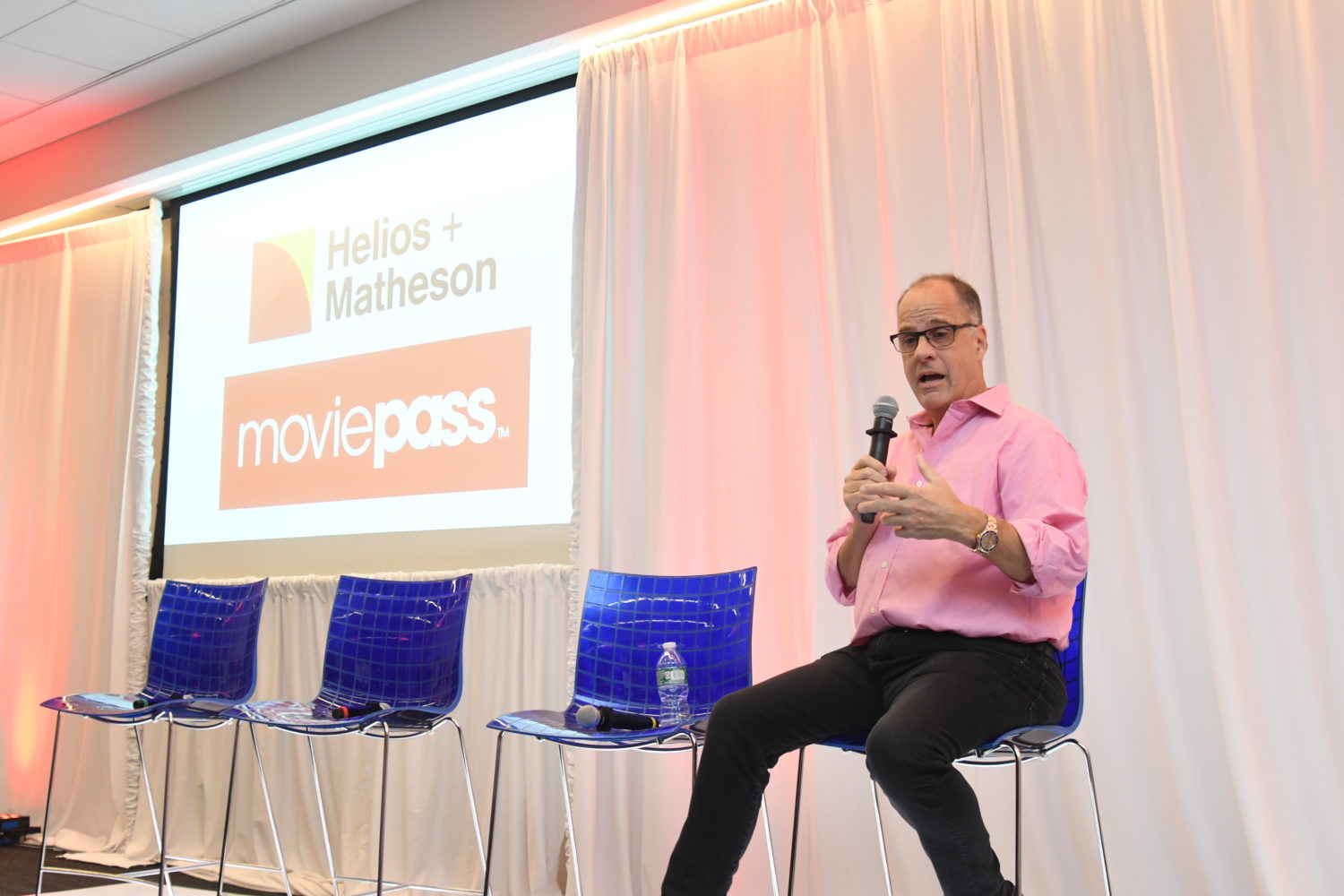Connections

MoviePass Exec: It’s All About the Data
Story Highlights
NEW YORK — Although MoviePass continues to lose money with its $10-a-month movie theater subscription service, subscriber numbers keep growing and profitability keeps getting closer, thanks largely to the valuable subscriber data that it’s collecting and new growth initiatives, according to Ted Farnsworth, CEO and chairman of parent company Helios & Matheson Analytics.
MoviePass also continues to find new ways to enhance the data it collects to make it even more valuable, he said July 24 during a keynote called “Disruption in the Entertainment Industry – Monetizing the MoviePass Effect” at the Smart Content Summit East event, part of the Media & Entertainment (M&E) Day at the Microsoft Conference Center.
For example, MoviePass subscribers have only been indicating whether they liked or didn’t like a movie they saw using the service. But MoviePass plans to implement a Rotten Tomatoes-like system in which subscribers will provide more details on what they liked and didn’t like about a movie, and also rate the movie, Farnsworth said. That “will launch over the next 90 days,” he said.
Initial feedback, meanwhile, has been encouraging for the surge pricing and 3D/IMAX premium screening option it recently started testing, he told the Media & Entertainment Services Alliance (MESA) after the keynote.
“I thought it was going to be a much rougher launch of surge pricing than it actually” was, he said, adding subscribers are “using it, they’re doing it, and we’ll see.” The test is being conducted “in all the different markets,” not just major cities like Los Angeles and New York, he told us. “We’re still testing — doing all kinds of testing,” and the upcharge is the same for all subscribers, he said, although the fee being charged across the board to subscribers varies based on factors he didn’t specify.
MoviePass has now attracted more than 3 million subscribers in less than a year, he said during the keynote.
It “just boggles my mind” that major studios don’t know exactly who is paying money to see one of their movies, he said, pointing to the value of MoviePass data that tells it a lot of info about who is going to see a specific movie using its service.
One way in which MoviePass will “drive growth” is by “owning our own movies,” he said, noting his company recently bought Emmett Furla Oasis Films, the maker of movies including “Lone Survivor.” That followed an announcement that the company started a MoviePass Ventures subsidiary that will co-acquire films with distributors.
The subsidiary recently backed the release of the movie “Gotti,” which — despite “horrible” reviews by critics — did “four times better” at the box office than MoviePass expected, Farnsworth told the summit. “A lot of that was us with MoviePass, pushing our subscribers to go see it,” he said.
Owning its own movies and “driving subscribers to the theater” by heavily promoting its films on the MoviePass app was part of the MoviePass strategy right from the start, he said. The crime drama “American Animals” — another movie backed by MoviePass Ventures — recently fared extremely well and MoviePass subscribers accounted for 83% of its opening weekend box office on a limited number of screens, he said. As the movie rolled out across the U.S., MoviePass subscribers wound up accounting for 48-50% of its box office, he said.
“It all comes down to data,” he said, adding: “We know our subscribers. We know what they like. We know what movies they go to — their genre, all these different things. Nobody else knows that.” MoviePass also uses that data to “push” subscribers to other companies’ films when “studios pay us to do that,” he said.
But he conceded it was hard “to put a number on” exactly how much that data was worth. That’s “a challenge” — at least for now, he said.
He compared MoviePass to movie theater chains, saying the only companies that sell more movie theater tickets than it does in the U.S. now are Regal Entertainment Group, Cinemark and AMC Entertainment. MoviePass revenue is “on a run rate” to be “well over $1 billion” in its first year, he said. The company will need to bring in revenue of $150 million-$180 million between now and the end of this year to reach the “break-even” point, he told the summit, adding he expects MoviePass subscribers to grow to 5 million by the end of this year.
One challenge for MoviePass has been studying its data to catch fraudulent activity by subscribers that he said has included some people seeing the same movie multiple times to profit from it in some way — such as by scalping some of the tickets. The company has also caught a small number of theaters charging more money for the same movie to MoviePass subscribers than it does to non-subscribers, he said.
The 2018 M&E Day also included Content Protection Summit East and Entertainment Production in the Cloud conference tracks, providing M&E technology teams valuable insights into the creation, production, distribution, security and analysis of content.
The 2018 Media & Entertainment Day is presented by Microsoft, with sponsorship from IBM Watson Media, Amazon Web Services, IBM, LiveTiles, Microsoft Azure, NAGRA, NeuLion, Ooyala, EIDR, GrayMeta, MarkLogic, Qumulo, Avid, Cloudian, SoftServe and TiVo. The event was produced by MESA, the Content Delivery & Security Association (CDSA), the Hollywood IT Society (HITS) and the Smart Content Council.
Click here for audio of Farnsworth’s presentation.









